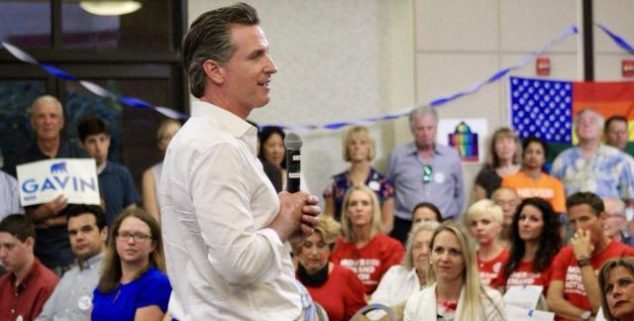News
ADEMs are crucial — and a bit of a mystery
 Gov. Gavin Newsom addresses a January ADEM gathering in San Francisco. (Photo: California Democratic Party, via Bay City Beacon)
Gov. Gavin Newsom addresses a January ADEM gathering in San Francisco. (Photo: California Democratic Party, via Bay City Beacon)Few Californians are familiar with the state Democratic Party’s Assembly District Election Meetings, known as ADEMs. Even fewer – under 40,000 – vote in them.
But as Democrats in 2019 wield nearly absolute power in state policy, the ADEMs – grassroots, internal elections held every two years designed to connect party insiders with the base – are gaining attention as a battleground between the party’s progressive and moderate blocs.
“I see delegates holding a few roles. One of the pieces is to get Democrats elected.” — Eric Sunderland.
“The delegates in the state determine who are the endorsed Democrats, what the party platform is, what the rules are, what resolutions are supported,” said Eric Sunderland, Region 3 director of the California Democratic Party.
Democrats hold a supermajority in both the state Senate and Assembly, as well as all major state and federal offices, including the governor and U.S. Senate. Since their power to govern faces little to no opposition this cycle, decisions within the party have an increased influence on the direction of state policy.
The delegate process can be hard to explain and easy to overlook.
ADEM delegates make up just one-third of the state’s 3,000-plus Democratic State Central Committee slots – the others going to Democrats holding office throughout the state, their appointees, and county committee party members.
“I see delegates holding a few roles,” said Sunderland. “One of the pieces is to get Democrats elected.
“The other important piece is holding them accountable,” he added.
Overall in 2019, progressives identified and supported 975 candidates to try and fill the state’s 1,120 ADEM slots. Two-thirds of these candidates won.
In 2017, Berniecrats and labor progressives swelled the ADEM elections, pushing turnout to over 33,000 voters – almost triple that of 2015 – and swept the state.
The secret to success in these elections is to form “slates” of candidates in all of the state’s 80 ADEM districts. Each district elects seven women and seven people who do not identify as women. If 14 progressives come together and agree to rally 50 friends each to vote for their slate, they can sweep the region.
“I have to be honest, elected officials hate that we run our slate,” said Anna Molander, District 7 delegate and executive board representative. “They often try to run slates against us, and we understand why they’re doing it.”
Assemblymember Jim Cooper was at the District 9 ADEMs in January, hoping to get some allies elected after local delegates last year blocked the party’s endorsement of his campaign.
Despite Cooper’s efforts, progressives swept the district.
Overall in 2019, progressives identified and supported 975 candidates to try and fill the state’s 1,120 ADEM slots. Two-thirds of these candidates won, and progressives swept 23 of the state’s 80 districts.
Progressives also took 42 of 80 possible executive board seats. This board, comprised of 330 state Democratic Party leaders, was responsible for snubbing US Senator Dianne Feinstein last year in favor of challenger Kevin de Leon.
But they did face challenges in some districts. In East San Francisco, state Sen. Scott Wiener and Mayor London Breed rallied supporters to vote, and only one progressive on a slate of 14 won. Voting there has increased from 664 in 2015 to 2,033 in 2019.
Winners of the 2019 ADEMs will join fellow members of the Democratic State Central Committee in May to vote for the next party chair at the California Democratic Convention
In West San Jose, a progressive slate of 14 took just three spots, with the vote count there increasing from 133 in 2015 to 1,026 in 2019.
Since the Democratic Party is a private entity, the ADEMs are not regulated by the California Fair Political Practices Commission. The resulting process is unorthodox. Candidates can ply votes using coffee, or even a mimosa brunch. They can also use dark, unregulated money to wine and dine voters.
Since the ADEMs are private, they are not open to the general public and only Democrats can vote. Constituents are, however, allowed to register as Democrats on-site the day of elections and vote.
At the District 9 election, Harjit Singh Gill, a No Party Preference voter and member of Democratic Socialists of America, registered as a Democrat to support his friend Peter Brogan, who won a seat. Democratic Socialists of America in Sacramento endorsed the progressive slates in Districts 7, 8 and 9 – each of which won handily — and reported that 11 DSA members in the region won delegate seats.
Sunderland says that, of the 1,200 people voting in Districts 7 and 9, some 270 were same-day registrants.
Winners of the 2019 ADEMs will join fellow members of the Democratic State Central Committee to vote for the next party chair at the California Democratic Convention on May 31-June 2. The election is being held as a result of former chair Eric Bauman stepping down over sexual assault allegations.
So far, Kimberly Ellis, who lost by a slim margin to Bauman in 2017, is running against party Vice Chair Daraka Larimore-Hall. While both are considered progressives, other candidates may come forward before the May election.
Party delegates may also look forward to more influence on their Capitol elected officials in the future. At last November’s Executive Board meeting, delegates began concrete talks aboutcreating a lobbying arm that would establish a heavier influence on party members in the state Legislature.
Want to see more stories like this? Sign up for The Roundup, the free daily newsletter about California politics from the editors of Capitol Weekly. Stay up to date on the news you need to know.
Sign up below, then look for a confirmation email in your inbox.

Leave a Reply